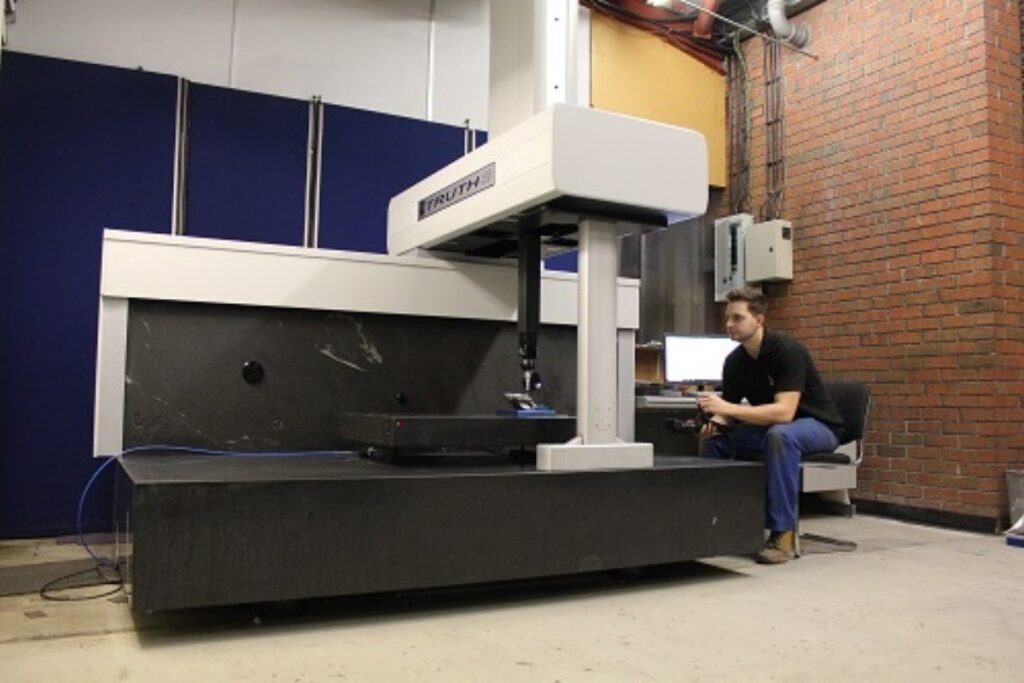In precision engineering and manufacturing, precision is everything. The smallest tolerance deviation on a component can result in catastrophic performance or safety ramifications. And this is where a Coordinate Measuring Machine, or CMM, has made a significant impact. These are extremely sophisticated machines used to measure the geometry of physical parts with very high precision to assure that manufactured parts are to design specifications.
As a quality control step, CMMs have become ubiquitous in the aerospace, automotive, electronics and medical device manufacturing industries . If you’re thinking of purchasing one, there are several reputable coordinate measuring machine manufacturers that provide solutions for varied industrial applications.
In this guide we’ll cover what a CMM is, how it works, the different types of CMMs and how to choose the right one for your business .
How Does a CMM Work?
The CMM works by means of a probe that travels across the surface of an object. The probe logs the coordinates over time at various points and this data is analyzed using specific software. The result is a true three-dimensional model of the part.
There are two general types of probes:
- Contact Probes: These touch the object’s surface to collect data. They are ideal for hard, rigid materials
- Non-Contact Probes – These use lasers or cameras and are suitable for delicate, soft, or easily deformed materials.
Depending on the complexity of the measurement task, CMMs can be manual or completely automated. They are especially advantageous in highly repetitive production processes.
Types of Coordinate Measuring Machines:
The selection of the most appropriate type of CMM is a function of part size, precision requirements, and application. These are mainly:
- Bridge CMM:These are the most common type. Its bridge structure moves over the object, making it suitable for small to medium objects .
- Cantilever CMM:Access to the measuring area is very good with this design and loading and unloading of parts is made easier.
- Gantry CMM:Gantry models are designed for very large and heavy pieces like aircraft parts or ship building.
- Horizontal Arm CMM:Ideal for measuring large, flat objects such as car body panels.
Portable CMM (Articulated Arm):Portable CMMs are relatively lightweight and easy to transport, and therefore can be very useful for measuring in place in a shop or factory.
Each has its own advantages and is intended for certain industrial applications.
Applications of CMMs in Modern Industries:
CMMs play a vital role across various industries, ensuring components meet stringent quality standards.
- Aerospace: Inspecting turbine blades, fuselage sections, and landing gear components.
Automotive: Measuring engine parts, body panels, and transmission systems for accuracy.
Medical Devices: Verifying the precision of implants, surgical instruments, and prosthetics.
Electronics: Checking printed circuit boards (PCBs) and micro-components.
Energy Sector: Inspecting large turbines and renewable energy components.
With such versatile applications, the demand for advanced CMM solutions continues to grow worldwide.
Why Choosing the Right CMM Manufacturer Matters:
When investing in a Coordinate Measuring Machine, the choice of manufacturer is just as important as the machine itself. A reliable manufacturer ensures not only high-quality equipment but also after-sales service, software updates, and technical support.
Trusted providers like meaxpert.com offer a wide range of CMM solutions tailored to different industries. They also guide buyers through the selection process, ensuring they choose a machine that fits their budget and operational needs.
- Before making a purchase, consider these factors:
Measurement accuracy required for your parts.
Size and weight of the components to be measured.
Software compatibility with your CAD/CAM systems.
After-sales support and training offered by the manufacturer.
Advantages of Using a CMM
✔ High Precision: CMMs can detect even the smallest dimensional deviations.
✔ Speed: Faster than manual inspection methods, especially in mass production.
✔ Flexibility :Capable of measuring complex shapes and geometries.
✔ Cost Savings: Reduces the risk of defects and rework.
Final Thoughts:
A Coordinate Measuring Machine (CMM) is no longer a luxury but a necessity in industries where precision and quality are critical. From ensuring product accuracy to streamlining the inspection process, CMMs are invaluable for modern manufacturing.
Before investing, always research coordinate measuring machine manufacturers and choose one that offers reliable products and excellent customer support. Companies like meaxpert.com are trusted names in the field, providing cutting-edge solutions to meet today’s industrial challenges.
By making the right choice, you can enhance your production capabilities and stay competitive in a precision-driven market.

